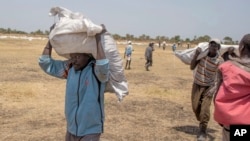The United Nations reports that aid workers have provided desperately needed food and other humanitarian aid to more than 338,000 South Sudanese facing famine in four key areas of Unity State.
U.N. aid agencies have been scaling up relief operations in famine-stricken Unity State since February 20, when the U.N. declared a localized famine in the region of Africa. The United Nations reports some of the 100,000 people facing starvation are dying, while another 1 million are on the brink of famine across war-torn Sudan.
Because of security concerns, the World Food Program has been airdropping food, emergency livelihood assistance, nutrition supplements, health and sanitation kits.
WFP spokeswoman Bettina Luescher told VOA airdrops are the only option when truck convoys are unable to go by road to deliver aid.
“Famines happen if aid workers do not have access and that was the issue in those areas," she explained. "Again and again over the past few years, we were able to avoid a famine in those areas, but these people now for a third time have been in a really dire situation and need the outside help. … It is crucially important that aid workers get access and, of course, funding is important, too.”
Spokesman for the Organization for the Coordination of Humanitarian Affairs Jens Laerke agreed. Unfortunately, he said a week after famine was declared in parts of South Sudan, 28 humanitarians were forced to leave Mayendit, one of the hardest hit areas, following skirmishes north of the town.
“Intensive negotiations were undertaken to try to get the aid workers back," he said. "They are critically needed in the response. However, renewed fighting has been reported on the outskirts of the town on the first of March and aid organizations — the 28 aid workers have not been able to return because of the continued fighting.”
Laerke said the U.N.’s lifesaving operation also is being hampered by a lack of funds. He said slightly more than nine percent of the $1.6 billion needed to carry out emergency operations this year has been received.




